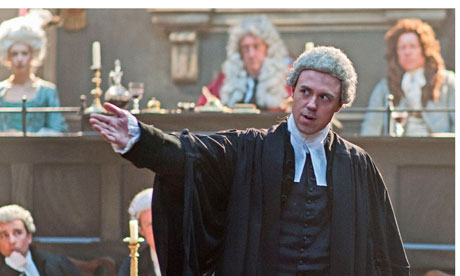Garrow’s Law. You guys. Wow.
So, I started watching this a few years ago; but I am
finally making my way from the beginning through the entire series. William Garrow is a brilliant lawyer who,
though from humble means, through his hard work as apprentice to the pragmatic
John Southouse, has raised himself to the level of a gentleman (such as his nemesis prosecutor Silvester) in his comings and goings at court.
 |
| from the Guardian |
The 18th Century, as you know, was a hugely pivotal
era in terms of the shifting of morals, laws and the state of human happiness
and well-being. Garrow helped propagate several changes, helping to usher
reform chiefly on behalf of prisoners. In an age where branding, hanging,
burning at stake and wrongful imprisonment for the slightest crimes awaited
those unfortunate and defenseless prisoners shoved into the dock at the Old
Bailey, Garrow coined his belief that every man be innocent until proven
guilty. With him, the law and the right of the prisoner for sane and solid and
solemn legal council changed.
Courtroom dramas are always riveting. For me, as a lover of
detective stories and mysteries, I enjoy how the truth is let out often in the
intricate and theatrical summations and evidence presented to the juries. This courtroom drama, however, stands heads
above any others because of its pure glee in excavating the strangest
historical cases: ripped directly from the Old Bailey’s records.
Historically, Garrow was able to assist those standing trial
for everything from infanticide, sodomy and high treason and loan a voice of
compelling and compassionate leniency when the crown would rather rid London
society of those even suspected of committing a crime. Evidence was hard come by and circumstantial
evidence prevailed: but Garrow’s quick mind and stern moral compass allowed him
to logically infuse the circus of the courtroom with sound counsel and
judgment. To add, he was extremely proficient at winning the sympathy and
understanding of a jury.
The series provides a fascinating glimpse, entrenched with verisimilitude,
into the cases that Garrow presided over.
Andrew Buchan plays Garrow as a lion in the courtroom but often out of
water when not in the realm of the law.
He excels at blunder-headed moves that lead to the entrapment of his
reputation by the cunning Sir Robert Hill, whose wife Lady Sarah, is an ardent
female voice in the male-dominated society of the court systems.
I have so enjoyed the pitch-perfect dialogue, the theatrical
antics, the climaxes and the denouement of each courtroom drama aside which
moments from Garrow’s personal life are added in centrifugal and apt
movement. Georgian society is a
fascinating one and the wigs, the costume make-up, the double standards and the
bawdy double entendre of a society rid of the manners ushered in with the Victorians
is on promenade here.
Check it out.
Note, I really enjoyed searching out the Old Bailey recordswhich are pristinely documented online for all to view.
As you can see from the screenshot, a search of William
Garrow elicits several of his cases ---those which the series are based on:



